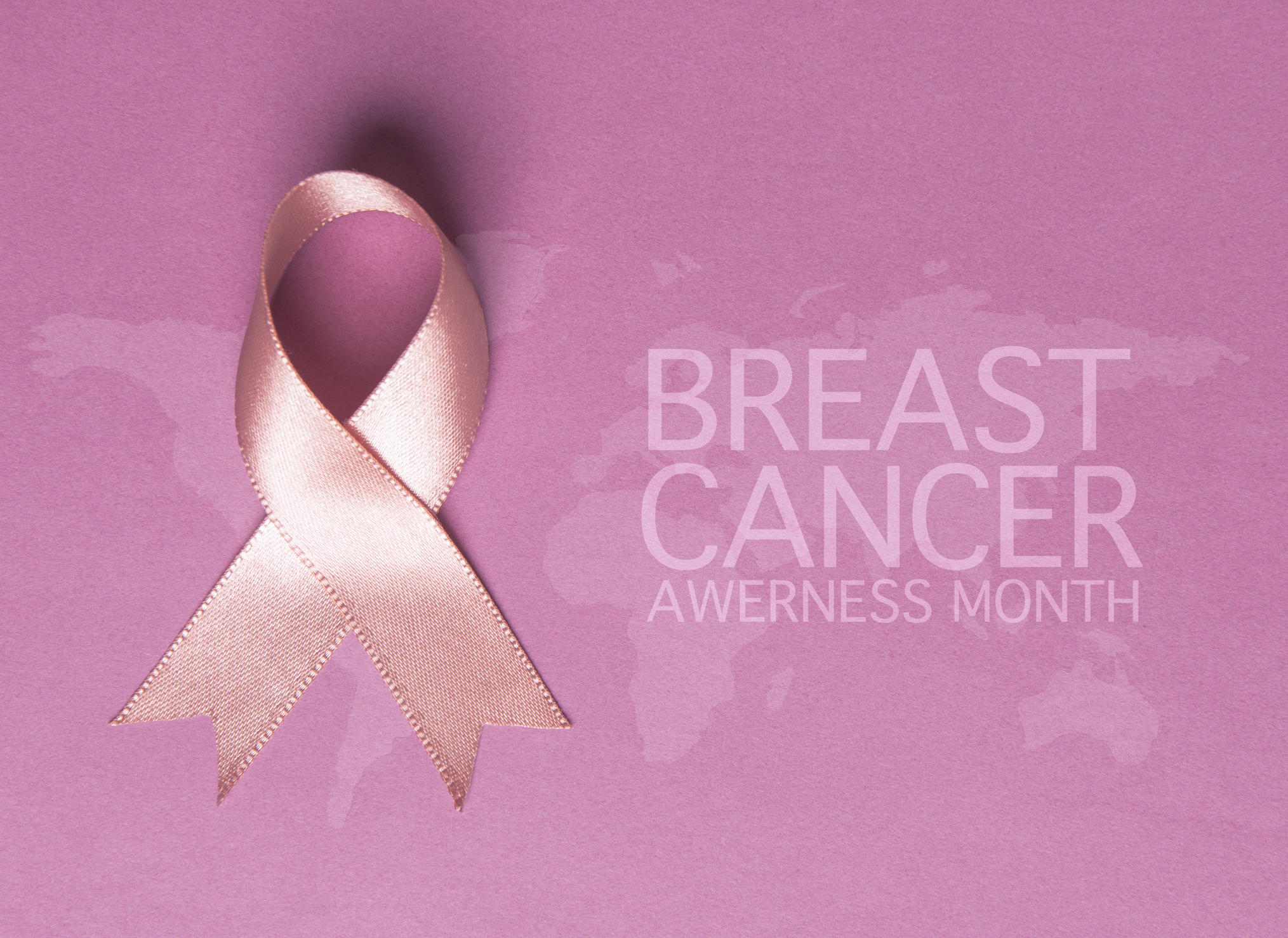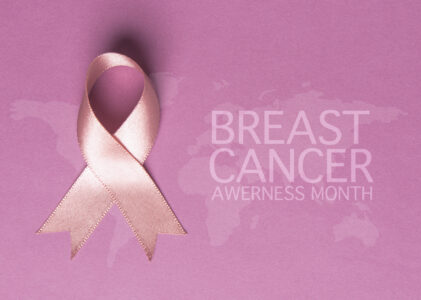Each October, Breast Cancer Awareness Month reminds us of the critical importance of early detection and proactive care. Despite growing awareness, breast cancer remains the most frequently diagnosed cancer among women and the second leading cause of cancer death in women in the United States.
The American Cancer Society reports that one in eight women will develop invasive breast cancer during her lifetime, yet survival rates are significantly higher when cancer is detected early.
The purpose of this month is not only to encourage regular screening but also to educate women about their personal risk factors, warning signs, and available diagnostic imaging. Greater Waterbury Imaging Center (GWIC) supports this effort through comprehensive breast imaging services, including MRI breast imaging and MRI-guided biopsy, which help physicians detect abnormalities earlier.
By sharing resources and promoting awareness, we can empower more women to take control of their breast health and improve outcomes through timely diagnosis and care.
Know Your Breast Cancer Risk Factors
Understanding your risk is the first step toward prevention. While being female and aging are the two strongest risk factors for breast cancer, several others can influence your likelihood of developing the disease. Some are beyond your control, while others can be modified through lifestyle choices and medical awareness.
What are Common Breast Cancer Risk Factors?
- Beginning menstruation before age 12
- Entering menopause after age 55
- Taking oral contraceptives or long-term hormone replacement therapy
- Family history of breast cancer, particularly among first-degree relatives
- Dense breast tissue or a previous breast cancer diagnosis
- Prior radiation therapy to the chest or breasts
- Carrying excess weight, especially after menopause
- Genetic mutations such as BRCA1 or BRCA2
Individuals with a BRCA1 or BRCA2 mutation face a significantly higher lifetime risk for breast and ovarian cancers. These genetic mutations are relatively uncommon, occurring in about one in 400 people, but are much more frequent in specific populations. For those with a known genetic predisposition, breast MRI is often recommended in addition to annual mammograms for more thorough surveillance. Learn more about the BRCA1 and BRCA2 genes from the Basser Center.
If you have multiple risk factors or notice any new changes in your breasts, it’s essential to talk with your doctor about screening and genetic counseling. Early testing can help identify potential issues before they progress, improving your chances for successful treatment.
Want to know more about how BRCA 1 and BRCA 2 gene mutations impact the risk for breast and ovarian cancers? Learn more about BRCA gene mutations and breast cancer risk factors.
Recognizing the Signs and Symptoms
Understanding the warning signs of breast cancer is essential for early detection and timely treatment. While not all breast changes indicate cancer, knowing what to look for and when to seek medical advice can make a crucial difference in outcomes.
Common Warning Signs
 Breast cancer symptoms can vary from person to person. You should contact your healthcare provider if you notice any of the following:
Breast cancer symptoms can vary from person to person. You should contact your healthcare provider if you notice any of the following:
- A new lump or mass in the breast or underarm
- Thickening, swelling, or irritation of the breast tissue
- Changes in breast size, shape, or symmetry
- Flaky or thickened skin, dimpling, or visible distortion
- Pain, tenderness, or retraction (pulling inward) of the nipple
- Unexplained nipple discharge, particularly if it’s bloody or occurs without squeezing
These signs don’t always indicate cancer; many benign conditions can cause similar changes, but they should never be ignored. Early evaluation allows for a quicker diagnosis and, if necessary, treatment planning. Learn more about breast cancer risk factors and screening recommendations.
Why Breast Cancer Symptoms are Often Missed
In many cases, early-stage breast cancer causes little to no pain or visible symptoms, which is why regular imaging remains the most reliable method of early detection.
- Mammograms can detect small tumors before they can be felt.
- Breast MRI provides greater sensitivity, especially for high-risk individuals or those with dense breast tissue.
Combining self-awareness with routine screening provides the best defense against late-stage diagnosis. Being proactive about your health—performing self-exams, scheduling annual screenings, and discussing any changes with your physician—can lead to earlier detection and improved survival rates.
Understanding Your Screening and Diagnostic Results
Receiving a mammogram or breast MRI report can feel overwhelming, but understanding how results are categorized can help you feel more confident about your next steps. Radiologists use a standardized reporting system, the Breast Imaging Reporting and Data System (BI-RADS), to interpret and communicate breast imaging findings. This classification ensures consistent results and clear recommendations for follow-up or treatment.
The BI-RADS Scoring System
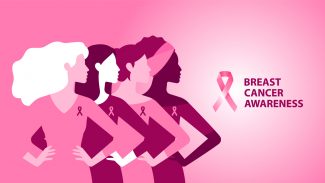
Each breast imaging study, whether a mammogram, ultrasound, or MRI, receives a BI-RADS score between 0 and 6, reflecting the level of concern and guiding what happens next:
- 0 – Incomplete: Additional imaging is needed for a complete evaluation.
- 1 – Negative: No signs of cancer or other abnormalities.
- 2 – Benign: Findings are non-cancerous (e.g., cysts or fibroadenomas).
- 3 – Probably Benign: Unlikely to be cancer; follow-up imaging is suggested in 6 months.
- 4 – Suspicious: There’s a possibility of cancer; a biopsy may be recommended.
- 5 – Highly Suspicious: Strong likelihood of malignancy; immediate diagnostic action is advised.
- 6 – Known Malignancy: Cancer has already been confirmed through a biopsy.
Understanding your BI-RADS score helps you and your doctor decide on next steps, whether that’s routine monitoring, additional imaging, or biopsy. Clear communication of these results allows for more proactive, informed decision-making and ensures patients receive timely care.
Wondering how to interpret your BI-RADS score, mammogram, or breast MRI results? Learn more about how to interpret BI-RADS categories and what they mean for your next steps in our article on Understanding Your Mammogram and BI-RADS Assessment.
Types and Stages of Breast Cancer
Understanding the different types and stages of breast cancer helps patients and families better grasp their diagnosis and treatment options. The type of cancer depends on where it begins in the breast, while staging indicates how far it has progressed.
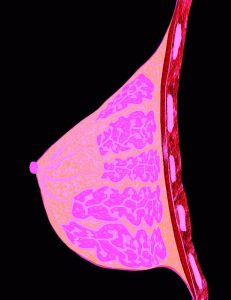 Main Types of Breast Cancer
Main Types of Breast Cancer
- Ductal Carcinoma in Situ (DCIS): A non-invasive form confined to the milk ducts. When treated early, DCIS has an excellent prognosis.
- Invasive Ductal Carcinoma (IDC): The most common type, accounting for about 80% of all cases. IDC starts in the ducts and can spread into surrounding tissue.
- Invasive Lobular Carcinoma (ILC): Begins in the milk-producing glands and may be more challenging to detect with mammography.
- Triple-Negative Breast Cancer: Lacks estrogen, progesterone, and HER2 receptors, making it more aggressive and less responsive to hormonal therapy.
- Inflammatory Breast Cancer: A rare but fast-growing form that causes redness, swelling, and skin thickening.
- Metastatic Breast Cancer: Indicates that cancer has spread beyond the breast to other parts of the body, such as bones, lungs, or liver.
Breast Cancer Staging
- Stage 0: Non-invasive or “in situ” cancer (DCIS).
- Stage I–II: Early-stage invasive cancer, typically localized within the breast or nearby lymph nodes.
- Stage III: Advanced local disease, where cancer has spread to multiple lymph nodes or nearby tissues.
- Stage IV: Metastatic cancer, meaning it has spread to distant organs.
Detecting breast cancer in early stages (0–II) dramatically improves survival rates, underscoring the importance of consistent screening and timely follow-up imaging.
Want to know more about the types of breast cancer and how to determine the stage of breast cancer you or a loved one might be in? Learn more about the types and stages of breast cancer in our guide, Breast Cancer Types, Staging, and Diagnostic Screening.
The Role of Breast Imaging in Early Detection
Early detection saves lives, and imaging plays a central role in identifying breast cancer before symptoms appear. Physicians use a combination of diagnostic tools to detect and evaluate abnormalities:
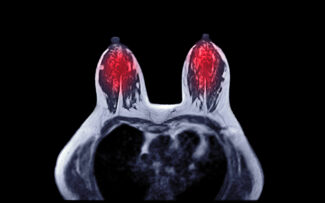
Diagnostic Tools
- Mammography: The most common screening tool for women over 40, capable of identifying tiny calcifications and masses.
- Ultrasound: Helps evaluate abnormalities found on mammograms, particularly useful for women with dense breast tissue.
- Breast MRI: Provides high-resolution, multiplanar imaging for high-risk patients or when mammogram or ultrasound results are inconclusive.
- Biopsy: Used to confirm cancer when imaging identifies suspicious lesions or masses.
Access to Screening for All Women
The CDC’s National Breast and Cervical Cancer Early Detection Program (NBCCEDP) ensures access to screening and diagnostic services for women who are uninsured or underinsured.
In 2021 alone, NBCCEDP-supported programs provided more than 250,000 breast cancer screenings, diagnosing over 2,300 invasive cases and 700 precancerous lesions, proving that accessible screening programs save lives.
Do you worry about having access to mammograms? Learn more about the NBCCEDP.
Supporting Breast Cancer Awareness and Continued Research
Awareness efforts help drive early detection, promote research, and provide emotional and financial support for patients and families. Community-based organizations, imaging centers, and healthcare providers all play key roles in ensuring access to quality care. Sharing reliable information and encouraging loved ones to schedule regular screenings can make a lasting impact in the fight against breast cancer.
Breast Cancer Awareness Month is more than a symbol; it’s a movement toward prevention, education, and early diagnosis. Understanding your risk factors, recognizing warning signs, and following regular screening guidelines can save lives.
Greater Waterbury Imaging Center provides advanced MRI breast imaging and diagnostic services to help detect breast abnormalities with precision and care. Our commitment to early detection supports better outcomes and peace of mind for every patient.
Greater Waterbury Imaging Center offers advanced MRI and diagnostic imaging for early breast cancer detection. Our team collaborates closely with referring physicians to deliver precise results and compassionate care. Contact us today to learn more about MRI breast imaging and early detection during Breast Cancer Awareness Month.

